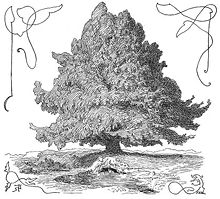Yggdrasil
In Norse mythology, Yggdrasil (pronounced /ˈɪɡdrəsɪl/; from Old Norse Yggdrasill, pronounced [ˈyɡːˌdrasilː]) is an immense tree that is central in Norse cosmology; theworld tree, and around the tree exist nine worlds. It is generally considered to mean "Ygg's (Odin's) horse".
Yggdrasil is attested in the Poetic Edda, compiled in the 13th century from earlier traditional sources, and the Prose Edda, written in the 13th century by Snorri Sturluson. In both sources, Yggdrasil is an immense ash tree that is central and considered very holy. The gods go to Yggdrasil daily to hold their courts. The branches of Yggdrasil extend far into the heavens, and the tree is supported by three roots that extend far away into other locations; one to the well Urðarbrunnr in the heavens, one to the springHvergelmir, and another to the well Mímisbrunnr. Creatures live within Yggdrasil, including the wyrm (dragon) Níðhöggr, an unnamed eagle, and the stags Dáinn, Dvalinn, Duneyrr and Duraþrór.
Conflicting scholarly theories have been proposed about the etymology of the name Yggdrasill, the possibility that the tree is of another species than ash, the relation to tree lore and to Eurasian shamanic lore, the possible relation to the trees Mímameiðr and Læraðr, Hoddmímis holt, the sacred tree at Uppsala, and the fate of Yggdrasil during the events of Ragnarök.
Yggdrasil comes from Old Norse Yggdrasill.[1] In English, the spellings Yggdrasil, Yggdrasill, and Ygdrasil are used, as shown by entries in English dictionaries and encyclopedias.[2][3][4] It is usually pronounced /ˈɪɡdrəsɪl/ in English, and only rarely /ˈyɡdrəsiːl/[5] because the sound [y] does not exist in English and most English speakers are therefore unaccustomed to producing it.
The generally accepted meaning of Old Norse Yggdrasill is "Odin's horse", based on the etymology that drasill means "horse" and Ygg(r) is one of Odin's many names. The Poetic Edda poem Hávamál describes how Odin sacrificed himself to himself by hanging in a tree, making this tree Odin's gallows. This tree was apparently Yggdrasil, and gallows can be called "the horse of the hanged", so Odin's gallows developed into the expression "Odin's horse", which then became the name of the tree.[1]
Nevertheless, scholarly opinions regarding the precise meaning of the name Yggdrasill vary, particularly on the issue of whether Yggdrasill is the name of the tree itself or if only the full term askr Yggdrasils refers specifically to the tree, where Old Norse askr means "ash tree". According to this interpretation, askr Yggdrasils means "the world tree upon which 'the horse [Odin's horse] of the highest god [Odin] is bound'". Both of these etymologies rely on a presumed but unattested *Yggsdrasill.[1]
A third interpretation, presented by F. Detter, is that the name Yggdrasill refers to the word yggr ("terror"), yet not in reference to the Odinic name, and so Yggdrasill would then mean "tree of terror, gallows". F. R. Schröder has proposed a fourth etymology according to which yggdrasill means "yew pillar", deriving yggia from *igwja (meaning "yew-tree"), and drasill from *dher- (meaning "support").[1]


No comments:
Post a Comment